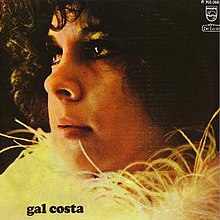Gal Costa is the first solo album by the Brazilian singer Gal Costa, released in 1969. It was ranked the 80th best Brazilian album of all time by the Brazilian Rolling Stone magazine.[5]
| Gal Costa | ||||
|---|---|---|---|---|
 | ||||
| Studio album by | ||||
| Released | 1969 | |||
| Genre | ||||
| Length | 39:12 | |||
| Label | Phillips Dusty Groove (reissue) | |||
| Producer | Manuel Barenbein | |||
| Gal Costa chronology | ||||
| ||||
| Review scores | |
|---|---|
| Source | Rating |
| AllMusic | |
| Encyclopedia of Popular Music | |
| MusicHound World | |
| Music Story | |
Considered one of the most representative records of the countercultural Tropicália movement, the album features songwriting by various artist associated with the movement, with whom Costa had previously worked with in the 1968 collaboration album Tropicália: ou Panis et Circencis. These include Caetano Veloso, Gilberto Gil and Torquato Neto.
Composition
editThe music in the album has been considered unprecedented.[2][6] It represents a strong departure from the style of Domingo, her debut album recorded with Caetano Veloso, which featured a "set of airy, somewhat standard bossa nova tunes".[2] Writing for Brazilian edition of Rolling Stone, Marcus Petro considered that, despite incorporating new influences from Janis Joplin and James Brown, Costa's music still retained strong bossa nova elements.[5] The sound of Gal Costa has been called "truly psychedelic and very much of its time, but also full of subtlety, as befits the melodic complexity and harmonic freedom" of its songs.[6]
Track listing
edit| No. | Title | Writer(s) | Length |
|---|---|---|---|
| 1. | "Não Identificado" | Caetano Veloso | 3:12 |
| 2. | "Sebastiana" | Rosil Cavalcanti | 2:23 |
| 3. | "Lost in the Paradise" | Caetano Veloso | 2:52 |
| 4. | "Namorinho de Portão" | Tom Zé | 2:34 |
| 5. | "Saudosismo" | Caetano Veloso | 3:10 |
| 6. | "Se Você Pensa" | Roberto Carlos, Erasmo Carlos | 3:15 |
| No. | Title | Writer(s) | Length |
|---|---|---|---|
| 7. | "Vou Recomeçar" | Roberto Carlos, Erasmo Carlos | 3:25 |
| 8. | "Divino, Maravilhoso" | Caetano Veloso, Gilberto Gil | 4:13 |
| 9. | "Que Pena (Ele Já Não Gosta Mais de Mim)" | Jorge Ben | 3:33 |
| 10. | "Baby" | Caetano Veloso | 3:33 |
| 11. | "A Coisa Mais Linda Que Existe" | Gilberto Gil, Torquato Neto | 4:00 |
| 12. | "Deus é o Amor" | Jorge Ben | 3:05 |
References
edit- ^ Pitchfork Staff (August 22, 2017). "The 200 Best Albums of the 1960s". Pitchfork. Retrieved April 15, 2023.
...Gal Costa veils hers in gauzy melodies and bossa nova–indebted vocals. Able to channel bossa icon João Gilberto...
- ^ a b c Thomas, Fred. "Gal Costa - Gal Costa". AllMusic. All Media Network. Retrieved December 4, 2016.
- ^ Larkin, Colin, ed. (2007). "Costa, Gal". The Encyclopedia of Popular Music (5th concise ed.). London: Omnibus Press. p. 356. ISBN 9781846098567.
- ^ Weiss, Mara; Beto, Nego; Lipp, Marty (2000). "Gal Costa". In McGovern, Adam (ed.). MusicHound World: The Essential Album Guide. Detroit: Visible Ink Press. p. 179. ISBN 1578590396.
- ^ a b Preto, Marcus. "Gal Costa (1969, Philips)". Rolling Stone Brasil (in Portuguese). Spring Publicações. Retrieved December 4, 2016.
- ^ a b "Gal Costa - Gal Costa". Unsung. Head Heritage Ltd. March 27, 2005. Retrieved August 8, 2015.